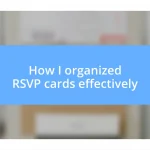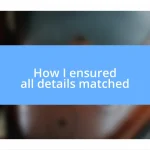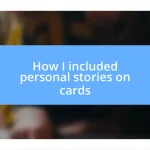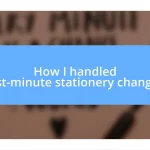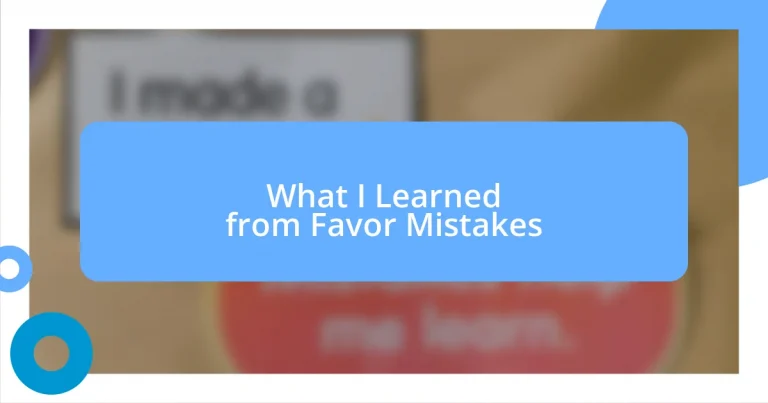Key takeaways:
- Mistakes can lead to personal growth by shifting our perspective from blame to curiosity and fostering self-awareness.
- Setting boundaries and communicating limits is crucial to maintaining healthy relationships and preventing overcommitment.
- Reflecting on past experiences and sharing insights with others creates a sense of community and reinforces the learning process.
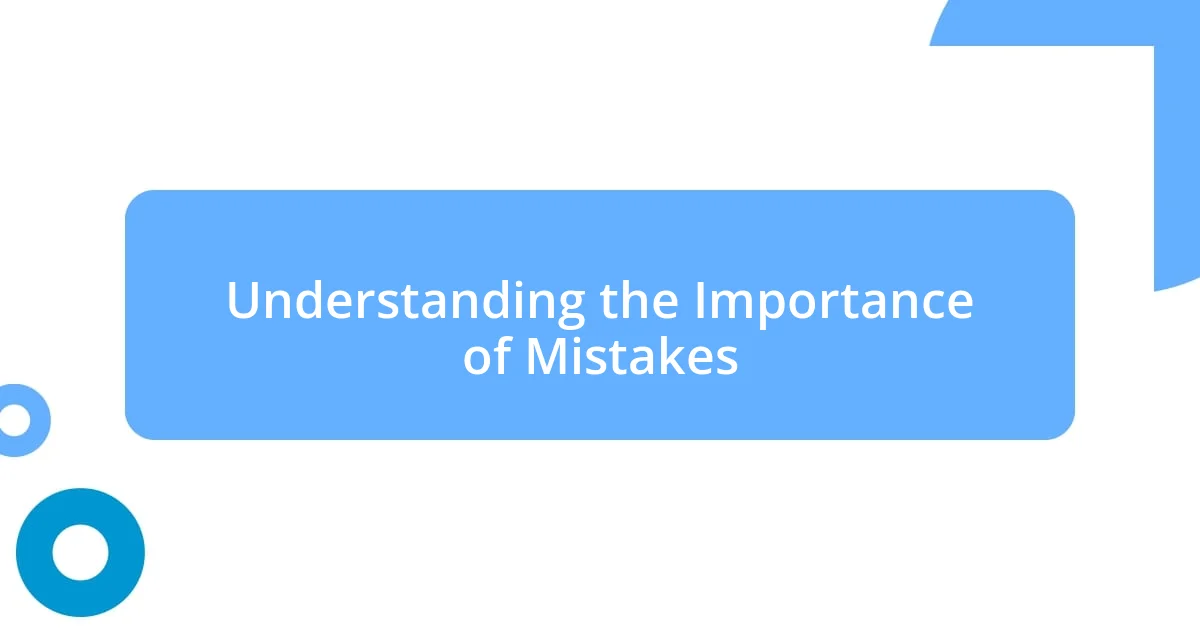
Understanding the Importance of Mistakes
Mistakes can often feel like setbacks, but I’ve come to realize they are invaluable teachers. I remember a time when I miscalculated a project timeline, which led to chaos. At first, I felt embarrassed, but that experience pushed me to develop better planning strategies. Have you ever learned more from a blunder than from a success? I certainly have!
Thinking back on my early career, I made quite a few mistakes that I thought would haunt me. One particularly memorable incident involved a presentation where I mixed up my figures, but that very error sparked a deeper understanding of the material. The embarrassment dulled over time, replaced by a newfound confidence to ask questions and clarify my understanding. Isn’t it interesting how embracing our faults can lead to growth?
When reflecting on my journey, I can’t help but smile at the myriad of lessons learnt through mistakes. Each slip-up chipped away at my fear of failure, transforming it into a vehicle for growth. How can we embrace the discomfort of mistakes to propel us forward? For me, it was all about shifting the perspective from blame to curiosity.
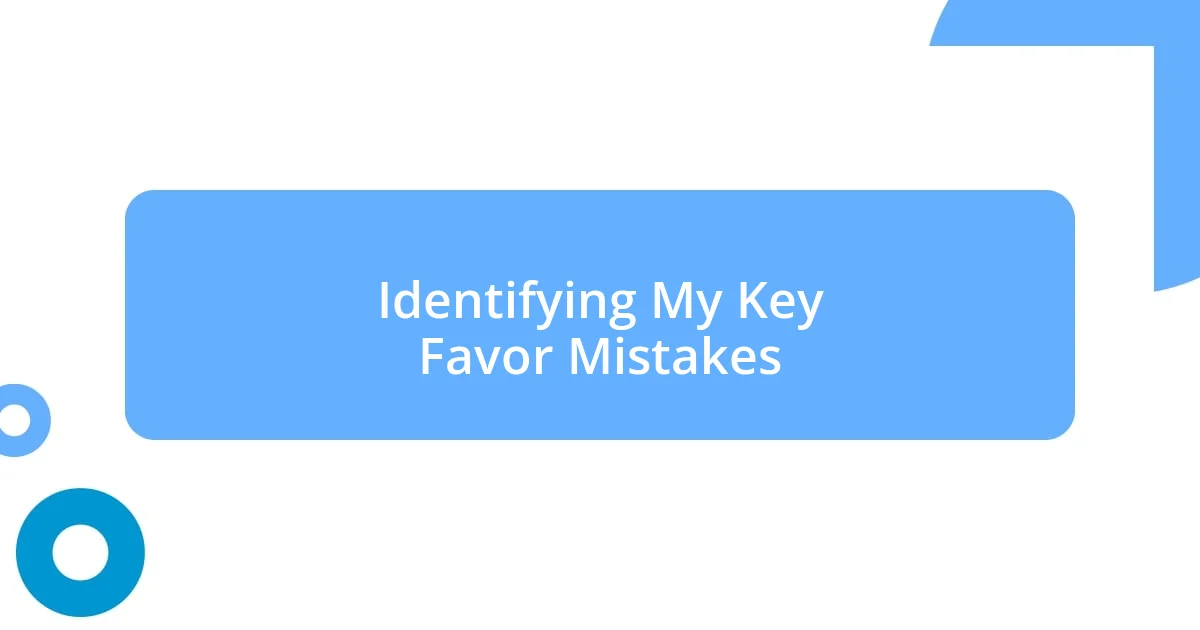
Identifying My Key Favor Mistakes
Identifying my key favor mistakes has truly been an eye-opening experience. I can vividly recall a time when I promised to deliver favor for a close friend without fully understanding the commitment involved. The pressure mounted, and when I ultimately fell short, I felt a mix of guilt and disappointment. That scenario highlighted my tendency to overcommit and left me with a valuable lesson about setting boundaries in relationships.
To further illustrate my journey, here are some key favor mistakes I often encountered:
- Saying yes without thinking: I rushed into agreements, often without considering my own capacity or time.
- Underestimating expectations: I didn’t clarify what was truly needed, which led to misaligned expectations with friends.
- Overcomplicating simple requests: Sometimes I made fulfilling a favor more complex than it needed to be, creating unnecessary stress for both myself and others.
- Neglecting self-care: I often put others’ needs before my own, ignoring when I needed a break or was already overwhelmed.
Each of these mistakes has crafted my understanding of balance and open communication in friendships. They serve as reminders that learning often comes wrapped in the lessons we’d rather not face.
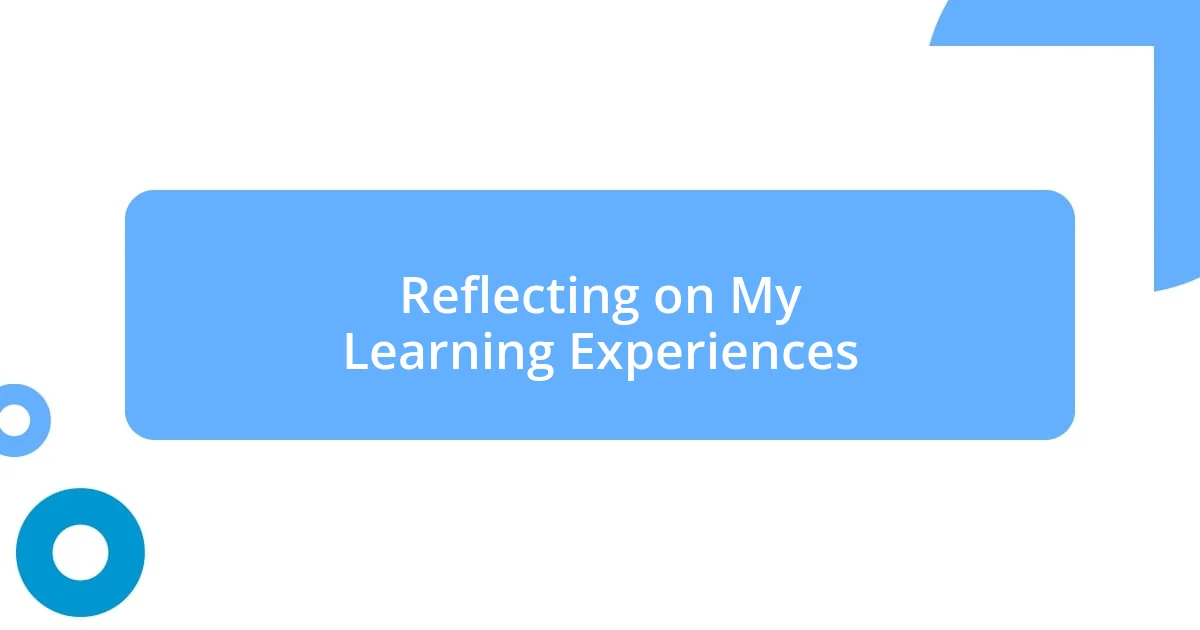
Reflecting on My Learning Experiences
Reflecting on my learning experiences has been a transformative journey. I remember a time when I thought it was essential to jump in and help everyone around me. I felt like a superhero, but I quickly discovered that spreading myself too thin left me feeling exhausted and unappreciated. Have you ever felt that way? That moment taught me the importance of self-awareness in my commitments, urging me to truly consider what I could handle before volunteering.
One particularly poignant experience was when I let a close friend down after overcommitting to too many favors. The disappointment in their eyes was a wake-up call for me. I didn’t just learn to say no; I learned to value honesty over obligation. It’s amazing how a tough moment can spark clarity, isn’t it? Reflecting on this, I realized that prioritizing transparency has significantly improved my relationships.
Each reflection leads me to deeper insights about my limits. I came to understand that mistakes are not the end but rather pivotal moments that steer us toward better choices. I recall how admitting my error brought a real connection with my friends. When I shared my struggles with overcommitment, they responded with empathy and support rather than judgment. Isn’t it interesting how vulnerability can strengthen bonds?
| Key Experience | Learning Outcome |
|---|---|
| Overcommitting to help others | Recognized the need for self-awareness and the importance of setting boundaries. |
| Letting a friend down | Learned that honesty is more valuable than obligation in maintaining relationships. |
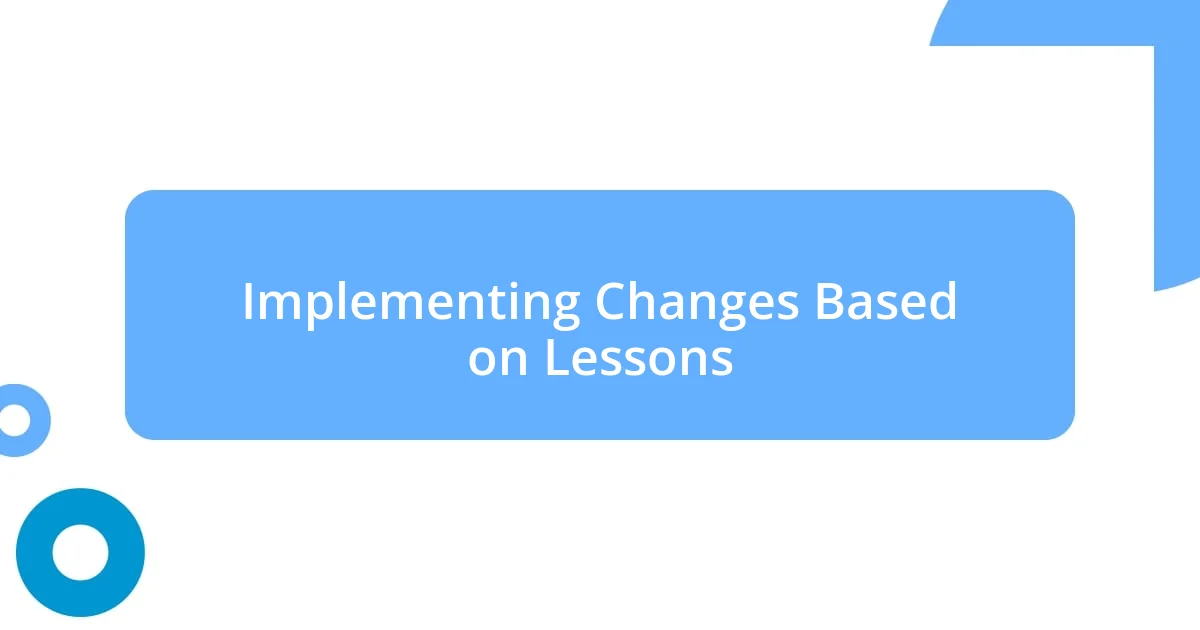
Implementing Changes Based on Lessons
Implementing changes based on the lessons you’ve learned is not always straightforward, but it’s crucial. I remember a time when I decided to start tracking my commitments. By keeping a simple journal, I could visually see where I was overcommitting. This small change drastically reduced the mistakes I made, as I became more aware of my limits. Have you ever tried something similar? It’s enlightening!
Another pivotal shift was my approach to communication. Initially, I often avoided difficult conversations about my own capacity, fearing I would let others down. However, I learned that expressing my limits upfront not only alleviated pressure but also fostered a more supportive environment. I distinctly recall telling a friend, “I can’t take that on right now, but I’d love to help in the future.” Their understanding response was a turning point, revealing how much people appreciate honesty.
Taking these lessons to heart has led me to embrace a philosophy of intentionality. Each time I made a conscious choice to prioritize my well-being first, I found deeper connections with those around me. It’s remarkable how a simple shift in mindset can transform relationships, wouldn’t you agree? Just by treating my commitments as precious instead of obligatory, I’ve not only improved my interactions but also cultivated a more nurturing dynamic among my friends.
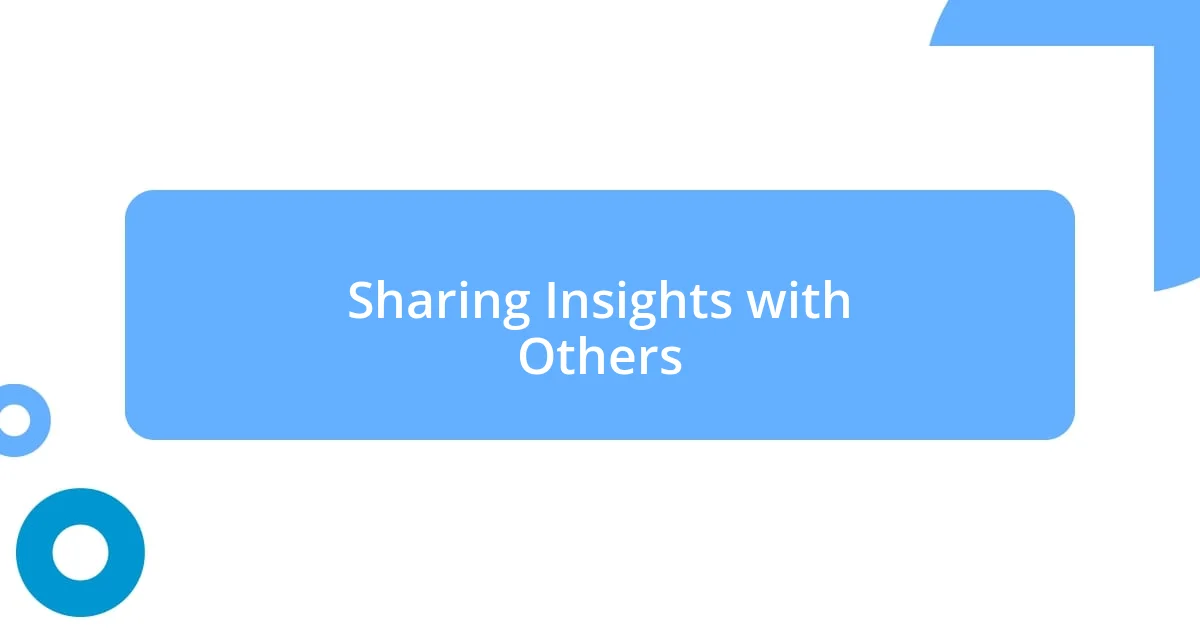
Sharing Insights with Others
When I started sharing my experiences and the insights I gained from my mistakes, I noticed a shift in how others responded. One day, I opened up during a casual dinner with friends about my struggle with saying no. Their reactions were eye-opening; many shared similar stories, and we began to exchange tips on setting boundaries. It felt liberating to know I wasn’t alone, and I realized that vulnerability creates a safe space for others to be authentic too.
I often reflect on how valuable it was to discuss my journey of overcommitting. It wasn’t just about my lessons; it sparked a dialogue that educated us all on the importance of self-awareness. Once, after sharing a story about how I burned out from trying to please everyone, a friend admitted they had been feeling the same way. Sharing my insights not only helped me but reignited a sense of community among us, highlighting how our struggles can connect us deeply.
Every time I’ve chosen to share, it has underscored the idea that our mistakes can be powerful teaching moments. I recall a group chat where I confessed to letting someone down. The support and understanding that flooded in were overwhelming. Have you ever noticed how sharing your setbacks can create a profound sense of belonging? For me, these conversations have showcased that our experiences, however flawed, can offer guidance to others while strengthening our relationships.
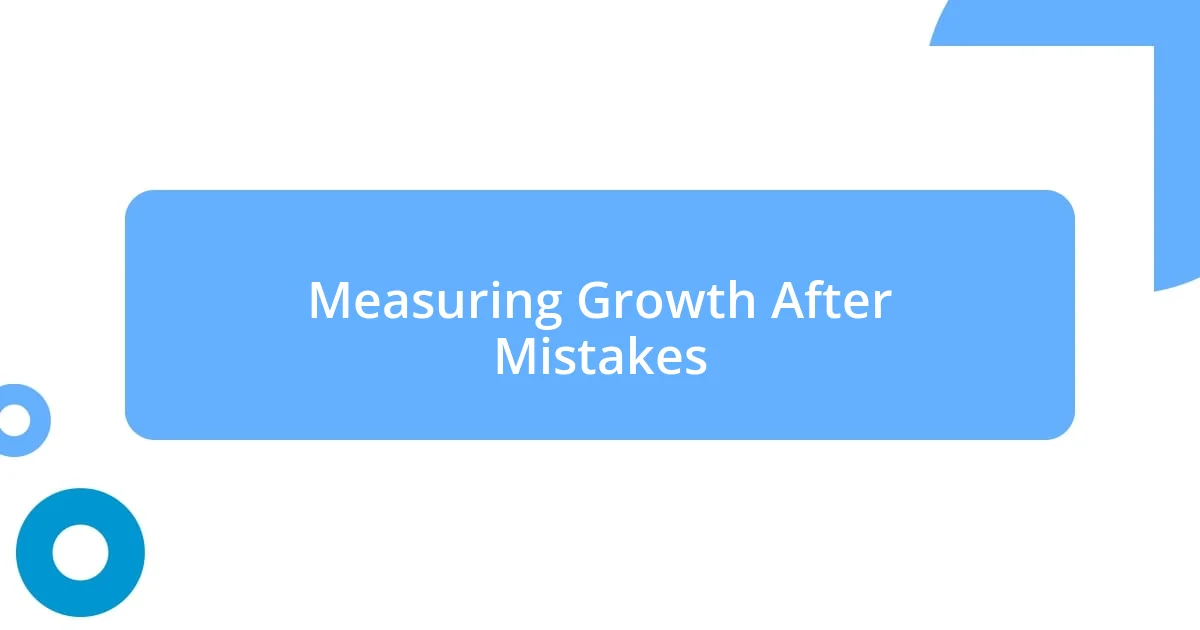
Measuring Growth After Mistakes
Measuring growth after mistakes often involves reflecting on how those experiences have shifted our perspectives. I remember a time when I misjudged a project deadline and delivered late. Initially, I felt embarrassed, but that mistake spurred a valuable realization about my planning skills. I started using tools like digital calendars, holding myself accountable, and noticed that I was becoming more realistic about my commitments. Isn’t it fascinating how one error can lead to better organizational habits?
After that incident, I began regularly assessing my progress. A simple weekly review of what went well and what didn’t became a cornerstone of my growth. This reflection not only highlighted areas needing improvement but also celebrated small victories, which motivated me to keep moving forward. Have you ever confronted your mistakes in this way? It’s powerful to quantify growth, whether through completed tasks or improved relationships, as it turns mistakes into stepping stones.
Eventually, I realized that growth isn’t linear, and that’s liberating. I remember sharing my weekly reflections with a close friend, who pointed out how I had grown in confidence after each misstep. This made me recognize that every mistake came with a lesson, sometimes about resilience rather than simply achieving goals. How do you check in with your growth? I believe embracing our imperfect journey encourages self-compassion and fosters a deeper understanding of ourselves.
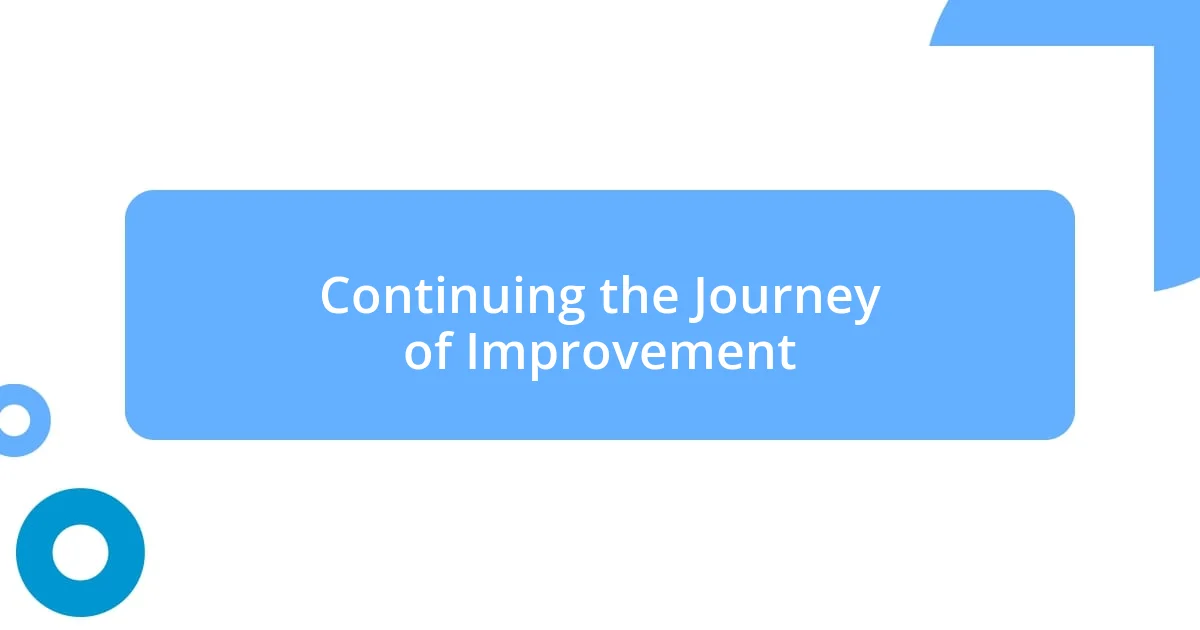
Continuing the Journey of Improvement
Continuing on the theme of improvement, I’ve learned that each mistake becomes a stepping stone when viewed through the right lens. For instance, there was a time when I misunderstood the needs of a team member during a crucial project turnaround. Instead of brushing it off, I reached out afterward to discuss what went wrong. That conversation not only clarified expectations but also deepened our working relationship. Have you ever had a miscommunication turn into a valuable lesson?
As I reflect on these moments, I realize that improvement often happens in small, unexpected ways. There was a project where I felt overwhelmed, and I didn’t ask for help until it was almost too late. This taught me the importance of recognizing my limits and communicating them. Today, I actively invite my peers to share their struggles too. This shift in mindset not only lightens my load but fosters a stronger culture of support around me. It’s amazing how vulnerability can lead to collective growth, don’t you think?
Continuing the journey of improvement means embracing both the highs and lows. After each setback, I’ve begun to jot down lessons learned in a dedicated journal. Recently, I reviewed past entries and was struck by how far I’ve come. Those reflections remind me that growth isn’t about perfection; it’s about progress. How do you record your own growth? I’d love to hear your approaches, as sharing these experiences can illuminate paths we never considered.



